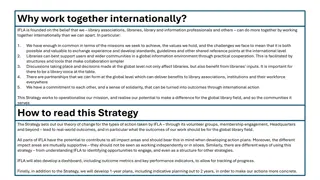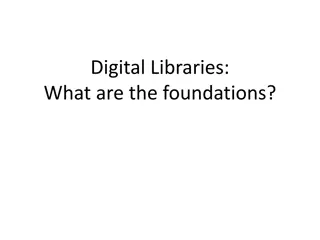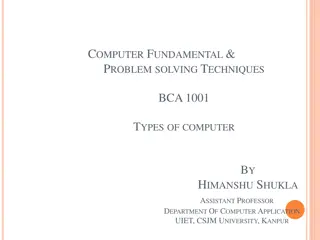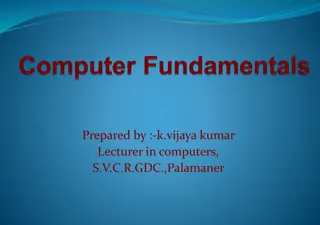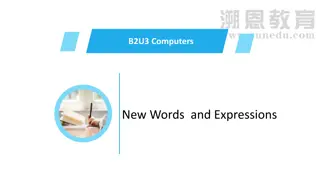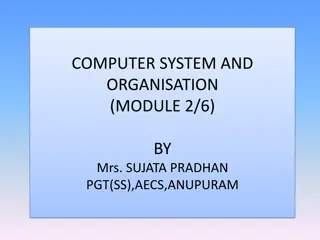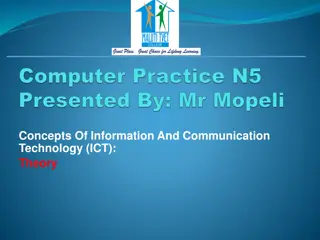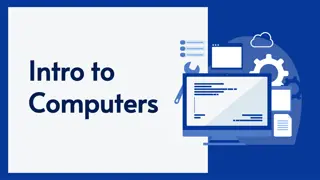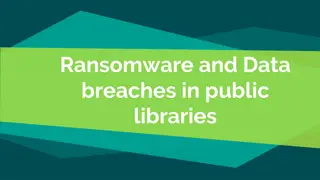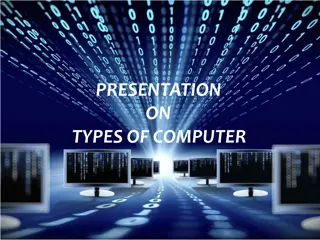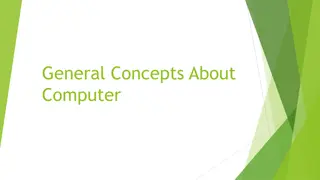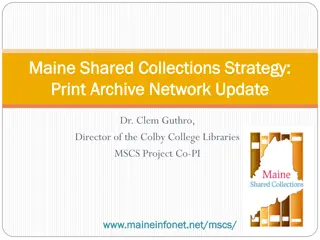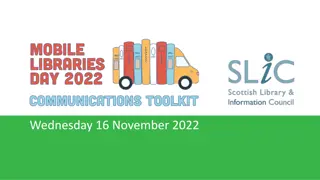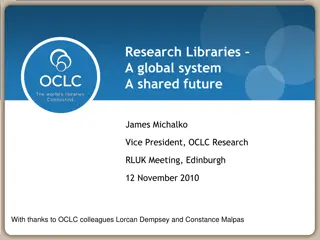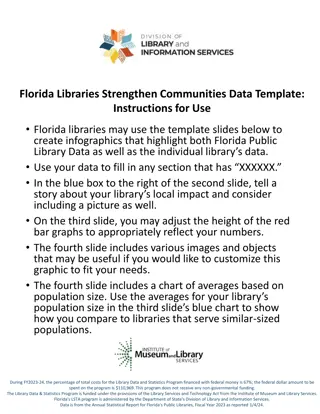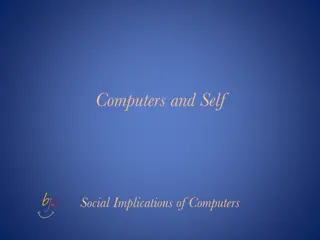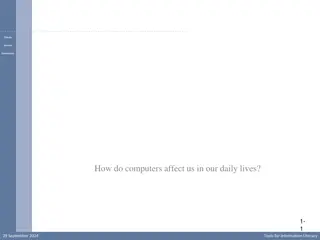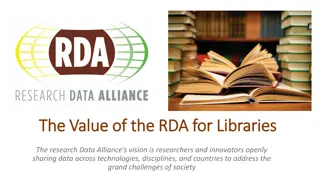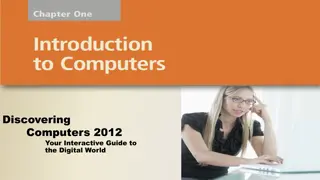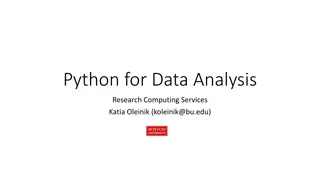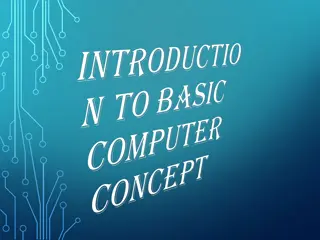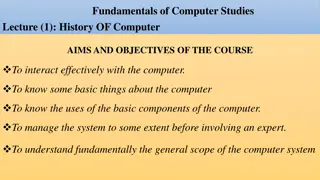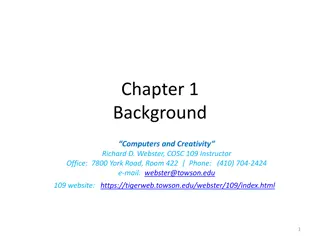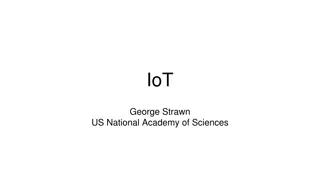Libraries, Sustainability, and the UN Sustainable Development Goals
Sustainability in libraries plays a crucial role in promoting inclusive development for current and future generations. Access to information is highlighted as a human right essential for decision-making in favor of sustainability. Meaningful access to information requires connectivity, equality, sk
4 views • 47 slides
Essential Factors Affecting Computers' Maintenance
Computers are susceptible to damage from various factors such as heat, dust, water, corrosive liquids, and powerline problems. To ensure optimal performance and longevity, it is crucial to monitor and address these elements to prevent potential harm. Proper maintenance practices like controlling hea
5 views • 14 slides
Working Together Internationally: IFLA's Vision for Global Library Engagement
IFLA emphasizes the value of international collaboration among library associations, libraries, and information professionals to exchange experiences, develop standards, and address common challenges. By working together, libraries can enhance user support, foster global information access, and advo
1 views • 6 slides
Overview of Digital Libraries and Their Foundations
Digital libraries are networked collections of digital objects that enhance knowledge building processes by addressing information overload, communication barriers, and research inefficiencies. Solutions include innovative technologies like mini-cameras, OCR, and natural language processing. Various
1 views • 26 slides
The Impact of Computers in Everyday Life
Computers play a vital role in various aspects of our daily lives, from education to business, healthcare, and banking. They help in converting data into meaningful information, enabling digital learning in schools, supporting businesses in marketing and management, aiding doctors in quicker diagnos
0 views • 9 slides
Types of Computers: Supercomputer, Mainframe, Mini, Workstation, Microcomputer
Computers come in various sizes and power ranges, each with unique capabilities. Supercomputers analyze nuclear fission models, mainframe computers have special circuits, mini computers support multi-user environments, workstations offer high processing speed, and microcomputers are affordable perso
0 views • 5 slides
Introduction to Computer Fundamentals: Learn the Basics of Computers
This tutorial covers fundamental concepts of computer hardware, software, and operating systems, explaining how computers process data, generate output, and store information. It explores the advantages of computers, such as high speed, accuracy, storage capacity, diligence, and versatility, essenti
1 views • 11 slides
Empowering Entrepreneurs: Libraries as Catalysts for Business Growth
Libraries play a vital role in supporting entrepreneurs by providing access to resources, knowledge, technology, and networking opportunities. They break down economic barriers, offer free services, and empower underserved populations like women and BIPOC entrepreneurs. From skills development to ex
1 views • 9 slides
Introduction to Computers: New Words and Expressions
Explore the fascinating world of computers with new terminology and expressions such as artificial intelligence, technology, exploration, and more. Discover the language surrounding computers and their applications, functions, and development. Enhance your understanding of this technological realm t
1 views • 19 slides
Introduction to Embedded Systems Design
Embedded Systems Design, Chapter 1 provides an insightful overview of embedded systems, distinguishing them from general-purpose computers. The chapter delves into the characteristics of embedded systems, their design considerations, and the various types of embedded computers such as general-purpos
1 views • 7 slides
Colorado Alliance of Research Libraries: MARC Record Matching System Overview
Designed and hosted by the Colorado Alliance of Research Libraries, the Gold Rush Analytics Technical Overview showcases a cost-effective system utilizing open-source software with tailored solutions. The Matching MARC section details the methodology for matching records, emphasizing the pre-built m
1 views • 10 slides
Understanding Computer Systems and Organizations
In this module by Mrs. Sujata Pradhan, learn about the characteristics of computers, their basic architecture, and the role of different units and memory types. Explore the classification of computers based on operation and configuration, including digital, analog, hybrid, supercomputers, mainframes
0 views • 13 slides
Understanding Types of Computers in Information and Communication Technology (ICT)
Explore the main types of computers in ICT, including Mainframe Computers, Servers, and Personal Computers such as Desktops, Laptops, and Tablets. Learn about their functions, uses, and distinguishing features to enhance your understanding of ICT.
1 views • 20 slides
Understanding Computers: Key Components and Characteristics
A computer is a programmable electronic device designed to process, store, and retrieve data. This article delves into the key components and characteristics of computers, including hardware, software, data processing, storage, input/output devices, networking, and programming. Computers play essent
0 views • 36 slides
Ransomware and Data Breaches in Public Libraries Analysis
Delve into the world of ransomware and data breaches in public libraries, exploring the definitions of ransomware and data breaches, the potential impacts on libraries, the financial losses incurred, and the value of library records. Understand the risks, implications, and consequences associated wi
0 views • 21 slides
Understanding Different Types of Computers
Explore the classifications of computers based on functionality, size, speed, and cost. Learn about analog, digital, and hybrid computers, their characteristics, and examples. Understand the distinct features and uses of each type in the world of computing.
6 views • 10 slides
Exploring General Concepts About Computers
Computers are electronic devices capable of accepting data, processing it based on instructions, and generating output. They can perform functions like input, processing, output, and storage. This article delves into the basics of what computers are, the difference between data and information, exer
0 views • 15 slides
Evolution of Computers: From Vacuum Tubes to Transistors
The evolution of computers has seen remarkable progress from the era of vacuum tube machines to the introduction of transistors. Starting from massive devices to compact and powerful systems, computers have become an indispensable part of modern life. Explore the generations of computers, their func
0 views • 22 slides
United for Libraries: Empowering Library Trustees and Friends
United for Libraries is a division of the American Library Association that supports library trustees, advocates, friends, and foundations in governing, promoting, advocating, and fundraising for libraries. Through training, advocacy resources, networking opportunities, and consulting, United for Li
0 views • 28 slides
Understanding the Computer Fraud and Abuse Act (CFAA) of 1984
The Computer Fraud and Abuse Act (CFAA) of 1984, later amended in 1992, addresses criminal and civil liability for unauthorized access to computers and obtaining information. The law distinguishes between outsiders and insiders who exceed their authorized access. It includes provisions related to na
12 views • 33 slides
Understanding Basic Concepts of Information Technology
Explore fundamental concepts in Information Technology including basic terms, types of computers, hardware, software, and general IT concepts. Learn about different types of computers such as supercomputers, mainframe computers, servers, networked computers, personal computers, laptops, and handheld
1 views • 13 slides
Library Collaboration in Maine: A Shared Collections Strategy
Library collaboration in Maine involves academic, public, and special libraries working together through the Maine Shared Collections Strategy (MSCS) project. Led by Dr. Clem Guthro of Colby College Libraries, the project aims to manage legacy print collections efficiently across various institution
0 views • 18 slides
Celebrating Mobile Libraries Day 2022 in Scotland
Mobile Libraries Day 2022 is set to be celebrated on Wednesday, 16th November, coinciding with Book Week Scotland. The day highlights the vital role mobile libraries play in combating social isolation and serving diverse communities in Scotland. With 49 mobile libraries in 22 local authority areas,
0 views • 19 slides
Exploring the Future of Research Libraries in a Global System
A discussion held during the RLUK Meeting in Edinburgh in November 2010, led by James Michalko, Vice President of OCLC Research, about the evolving role of research libraries in the digital age. The presentation highlights the impact of the network on libraries, reconfiguring industries, the changin
0 views • 24 slides
California Public Libraries Survey 2020-2021 Overview
The California Public Libraries Survey for 2020-2021 provides an in-depth look at the state of libraries in California. This webinar covers the survey process, data elements, resources, and the importance of the survey in understanding and meeting community needs. Learn about the National Public Lib
0 views • 25 slides
Florida Libraries Strengthen Communities with Data
Florida libraries are enhancing communities through data-driven initiatives, showcasing the impact of public library services. Utilize the provided template to create infographics highlighting the data from Florida libraries and individual library statistics. Explore the local impact of libraries, s
0 views • 4 slides
Implications of Computers on Human Existence and Behavior
Exploring the philosophical debate between free will and predestination, the influence of online personas on real-life identities, the potential for computers to understand us better than ourselves, and the evolving role of humans in an increasingly automated world. These themes delve into the compl
0 views • 6 slides
Evolution of Computers in Daily Life
Computers have significantly transformed our daily routines over the years, from simple tasks like setting alarms to complex operations like online shopping and banking. The progression from basic functions to advanced capabilities has revolutionized how we interact with technology on a day-to-day b
0 views • 36 slides
Enhancing Libraries' Role Through RDA Engagement
Explore how libraries can benefit from engaging with the Research Data Alliance (RDA), including opportunities to interact with data professionals, researchers, and academics, enhance expertise, and contribute to global data interoperability solutions. Discover the value of RDA for libraries and inf
0 views • 10 slides
Strategies for Keeping ARL Rankings Relevant in Research Libraries
Amidst reports of Penn State University Libraries ranking among the top ten North American research libraries based on ARL's Library Investment Index Rankings, this presentation by Adam Siegel from UC Davis highlights key strategies to ensure continued relevance and success in ARL rankings. The impo
0 views • 17 slides
Introduction to Discovering Computers: Your Interactive Guide to the Digital World
Delve into the world of computers with "Discovering Computers 2012," exploring basic concepts such as the definition of a computer, its components, importance of computer literacy, and the role of computers in various sectors. Discover the distinctions between system and application software, types
0 views • 38 slides
Understanding the Importance of Oral Communication in Modern Libraries
Deborah Turner from Drexel University presented research on the impact of oral communication in libraries, highlighting the significance of verbal interaction in a digital age. The study emphasizes the preference for personal interaction, especially among certain demographic groups like teens, senio
0 views • 12 slides
Overview of Python Libraries for Data Science Research
Python Libraries for Data Science are essential for conducting research and analysis. This overview covers key libraries such as NumPy, SciPy, Pandas, and SciKit-Learn, which provide tools for data manipulation, statistical operations, and machine learning algorithms. These libraries enable data sci
1 views • 47 slides
Special Pricing on Surplus Computers - Dell, Optiplex, iMac, Monitors
Explore a variety of surplus computers including Dell Optiplex GX series, iMac G4 & G5, and monitors at discounted prices. Contact the surplus specialist for availability and grab deals starting from $50. All computers come with essential accessories like keyboard, mouse, and power cord.
0 views • 4 slides
Evolution of Computing: From Abacus to Computers
The history of computing traces back to the invention of tools like the Abacus and Napier's Bone, leading to the development of advanced computing devices such as slide rules and ultimately modern computers. Computers have evolved to become programmable machines that receive input, process data, and
0 views • 7 slides
Evolution of Computers: From Abacus to Personal Computers
Explore the fascinating journey of computers through history, from the invention of the Abacus in 4000 BC to the development of personal computers in the modern era. Learn about the four generations of digital computers, the impact of integrated circuits, shifts in programming languages, and societa
0 views • 17 slides
Fundamentals of Computer Studies: Understanding the Evolution and Importance of Computers
Computer studies cover the history, aims, and objectives of computers, emphasizing their vital role in today's world. The course explores basic computer components, data processing, and the transformation of manual tasks to automated processes. Computers are indispensable tools for efficiency and pr
0 views • 13 slides
Understanding Digital and Analog Information in Computers
Explore the concepts of digital and analog information in computers through examples like thermometers, sound, and sight. Learn how computers process discrete digital data compared to continuous analog information, and why understanding both is essential in digital media courses. Delve into the conv
0 views • 49 slides
Evolution of IT: Three Generations and the Impact of IoT
Understanding the evolution of Information Technology through three generations - from connecting people to computers and information on the internet to the current Internet of Things (IoT) era where computers interact without human intervention. The potential for IoT to connect computers, access in
0 views • 8 slides
Libraries' Commitment to Accessibility for All in the United States
Nancy Bolt & Associates, in collaboration with the International Federation of Library Associations (IFLA), presented on the importance of access for people with disabilities in the United States. The presentation highlighted the commitment of libraries to ensuring accessibility for all individuals,
0 views • 15 slides


